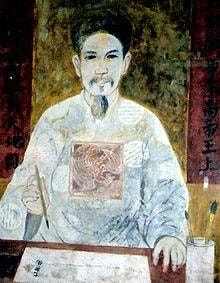Composing poems, submitting petitions, teaching or prescribing medicine with Chu Van An were all to save people.
The legend at Thanh Liet communal house, where Chu Van An is worshiped as Thanh Hoang, recorded that he was born in the year of Nham Thin (1292) and died in the year of Canh Tuat (1370); his hometown was Van village, Quang Liet commune, Thanh Dam district (now Thanh Tri district), Hanoi.
 |
Painting of Chu Van An in a temple in Hanoi. Photo: AV (st) |
Cranes dance in the yard, clouds in the cage door,
Sip the dew flower, relax your mind.
Hidden by the peach blossoms, life is peaceful,
Sweeping the stone lute, I borrow the East wind.(1)
However, in the royal court, he secretly made an assessment of the qualities of high-ranking officials, distinguishing between righteous and evil, loyal and flatterers. Entering the Dai Tri period (1358-1369), when Minh Vuong had passed away (1329), Du Vuong was immersed in pleasure and debauchery. Unable to contain himself, he picked up a pen and wrote "So that tram" to Tran Du Tong, openly demanding the execution of seven treacherous officials, with the hope of saving the scandalous situation of the Tran dynasty. It was exactly as Le Trung commented: "That tram chi so, nghia dong quy than" (The petition demanding the execution of seven men, the chivalry shook both ghosts and gods). Please note, some versions say "That tram chi so, nghia dong can khon" (The petition demanding the execution of seven men, the chivalry shook both heaven and earth). The petition shook public opinion at the time, and furthermore, had a lasting influence on many generations of Confucian scholars in our country. Anyone, anywhere, mentioning the name Chu Van An does not forget to mention, praise and admire "So That Tram". Here is the Chinese poem "Vinh Chu An" by poet Cao Ba Quat (1809-1854) through the poetic translation of Vu Mong Hung:
Responding to the loyal and heroic spirit,
One hand wants to pull back the pink.
The thunder and lightning are not calm,
Seven-slash demon must be heart-rending.
Heaven and earth reflect the same heroic spirit,
The country remains forever noble.
Where is the hidden place of the golden spring?
The Temple of Literature still has its name, the incense smoke is strong! (2)
It was said that because the king was weak and did not dare to approve the "Seven-Cut Memorial", Chu Van An immediately resigned from his official position and went to Phuong Hoang Mountain (Chi Linh District, Hai Duong Province today) with its beautiful and elegant scenery, built a house to teach and prescribe medicine to save the people. During this time, he took the name Tieu An. In addition to prescribing medicine, Chu Van An also studied and wrote books on Oriental medicine.
The book Y hoc yeu giai tap chu di bien, which is said to have been compiled by him, is valuable and contributed to the development of the country's medicine. According to Professor Vu Ngoc Khanh, besides the book Y hoc yeu giai tap chu di bien, the book Thanh Tri Quang Liet Chu thi di thu also has records about medicine, astronomy, and feng shui by him. However, these documents still need to be verified before they can be confirmed as being by Chu Van An. (3)
Living in seclusion to protect himself, cultivating his mind and virtue, dispensing medicine and teaching, but Chu Van An's heart for the Tran dynasty, the country and his race was still passionate and unceasing. History books also record that in 1369, Tran Du Tong died, and Cung Tuc Vuong's adopted son, Duong Nhat Le, wanted to end the Tran dynasty and establish an imperial dynasty for the Duong dynasty.
Tran Phu and the Tran royal family joined forces to raise an army, captured and killed Duong Nhat Le, then brought Cung Tinh Vuong - Du Tong's younger brother - to the throne, that is Tran Nghe Tong.
At the age of 77, Chu Van An heard that the court had destroyed the rebellion plot and kept the Tran dynasty, so he did not mind his old age and weakness, and went back to the capital with a cane to congratulate... Tran Nghe Tong invited him to stay and be an official, but he firmly refused (3). Less than a year later, on November 28, Canh Tuat year (1370), Chu Van An breathed his last, leaving behind for posterity a shining example in many aspects!
A Confucian scholar with upright morals, a noble hermit untainted by the dust of the world, a virtuous and moral teacher, a poet of nature with unique exploration - that was Chu Van An. Therefore, his physical form has passed away, but his good name will forever be passed down through history books, poems, temples, folk tales...
The person who wrote the Zen poems:
The body is as leisurely as a drifting cloud,
Wind and moon on half pillow, life is light.
The mortal world is far away, the Buddha world is clear,
Yard, flowers like blood, birds chirping.
(Poetry translation by Dao Thai Ton)
He was also the one who wrote "So That Tram" and "Y Hoc Yeu Giai". It turned out that this man had a leisurely body but not a leisurely mind. Composing poems, submitting memorials, teaching, or prescribing medicine to cure diseases, all were to save people!
(1)- (2): Quoted from Tran Le Sang, in the book Life and Poetry of Chu Van An, Hanoi Publishing House, 1981, p. 187.
(2): Vietnamese Cultural Dictionary, edited by Professor Vu Ngoc Khanh, Culture and Information Publishing House, Hanoi, 2009, p. 53.
(3): See Dang Duy Phuc, book Thang Long - Dong Kinh - Hanoi, homeland and gathering place of talents, Hanoi Publishing House, 1996, p. 175.
KH


